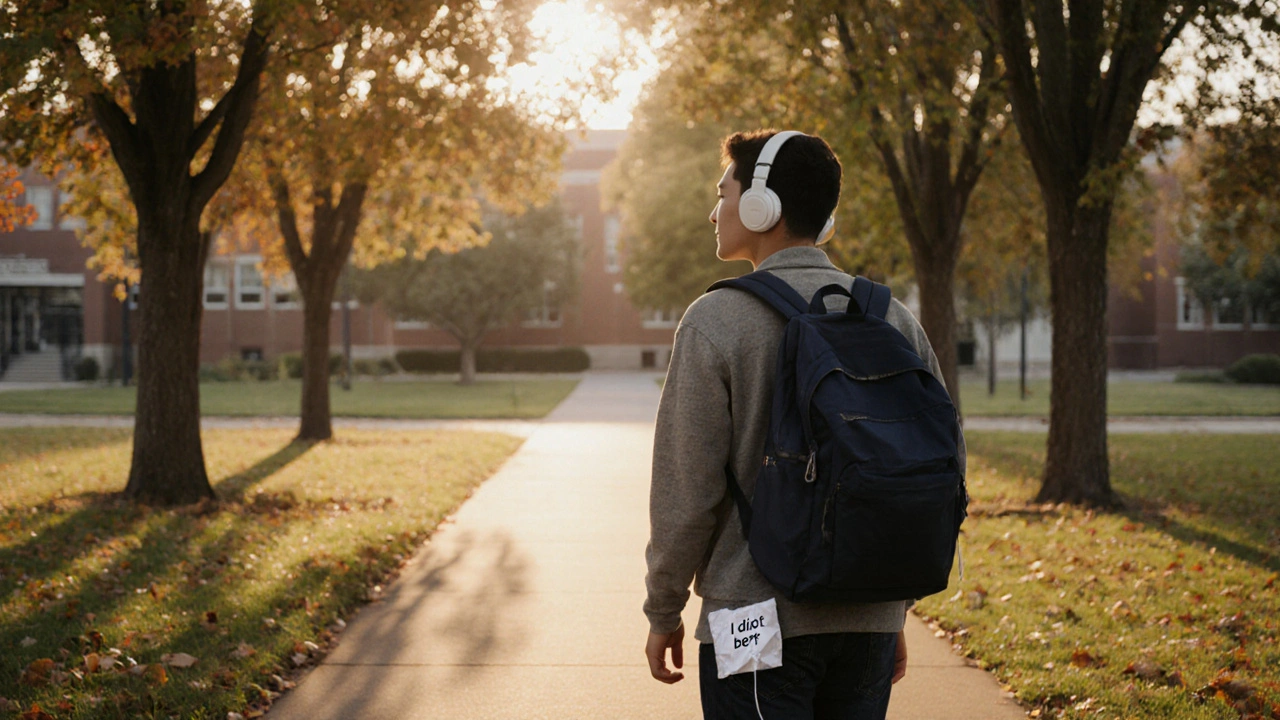
It’s 2 a.m. You’ve reviewed every flashcard, re-written every note, and still your heart won’t stop pounding. Your palms are sweaty. Your stomach feels like it’s tied in knots. You keep thinking: What if I blank? What if I fail? You’re not broken. You’re not lazy. You’re just human-and millions of UK students feel exactly the same way before exams.
Exam anxiety isn’t just "being nervous." It’s a real, physical response to pressure. Your body thinks it’s under threat. Your heart races. Your breathing gets shallow. Your mind goes blank-even when you know the material inside out. And in the UK, where GCSEs, A-Levels, and university finals carry heavy weight, this stress isn’t rare. It’s normal. But it doesn’t have to control you.
Why Exam Anxiety Hits So Hard in the UK
In England, Wales, and Northern Ireland, exam results can shape your next five years. A single grade might decide if you get into sixth form, university, or even your dream career. That kind of pressure doesn’t just come from teachers or parents. It’s baked into the system. The Ofqual reports show that over 60% of UK students report moderate to severe anxiety before major exams. That’s more than half of all students.
It’s not just about the test itself. It’s the silence that comes after. The waiting. The fear of disappointing others. The fear of disappointing yourself. And when you’re used to being told "you’re smart," failing-even slightly-can feel like a personal collapse.
But here’s the truth: exams don’t measure your worth. They measure how well you performed under pressure on one day. And pressure? That’s something you can learn to manage.
What Happens in Your Body When You Panic
When anxiety spikes, your brain flips into survival mode. The amygdala-the part that senses danger-sounds the alarm. Your body releases cortisol and adrenaline. Your muscles tighten. Your breathing shortens. Blood rushes away from your stomach and brain, straight to your legs (so you can run, if needed). That’s why you feel dizzy, nauseous, or like your mind has gone blank.
This isn’t weakness. It’s evolution. Your body was built to escape lions, not sit in a quiet exam hall for three hours. But today, that same system kicks in for a maths paper.
Here’s the good news: you can retrain your nervous system. You don’t need to eliminate anxiety. You just need to stop letting it hijack your performance.
Three Things to Do the Night Before
You’ve studied. You’ve prepared. Now it’s time to let your brain rest.
- Stop reviewing after 9 p.m. Your brain consolidates memory while you sleep. Cramming after dark doesn’t help-it stresses you out. Instead, write down three things you know you’ve nailed. Keep it simple: "I understand quadratic equations," "I can explain photosynthesis," "I remember the dates of the Tudor dynasty."
- Do a 5-minute breathing exercise. Breathe in for 4 seconds. Hold for 4. Breathe out for 6. Repeat five times. This signals your body: "We’re safe." No apps needed. Just you, your breath, and a quiet room.
- Prepare your exam kit before bed. Put your ID, pens, calculator, water, and snacks in one bag. Lay it by the door. When you know everything’s ready, your brain relaxes. No last-minute panic at 7 a.m.

What to Do Right Before the Exam Starts
You’re in the exam hall. Everyone’s silent. Your heart’s thumping. You’re not alone.
Here’s what works, based on real student reports and psychology studies:
- Use grounding techniques. Name 5 things you can see. 4 things you can touch. 3 things you can hear. 2 things you can smell. 1 thing you can taste. This pulls your brain out of panic mode and back into your body.
- Don’t talk to others about the exam. Someone will say, "Oh my god, I didn’t revise that topic!" That’s not helpful. It’s fear spreading. Smile. Nod. Stay quiet.
- Take slow breaths while waiting. In through the nose for 4 seconds. Out through the mouth for 6. Do this for 30 seconds. It lowers your heart rate and calms your nerves.
During the Exam: What to Do When Your Mind Goes Blank
You read the question. Nothing comes to mind. Panic rises. You start to write something-anything-just to fill the space.
Stop.
Here’s what to do instead:
- Put your pen down. Close your eyes for 10 seconds. Breathe. Don’t fight the blankness. Let it be there.
- Move to another question. Skip the one that’s stuck. Start with the easiest. Answer what you know. Momentum builds confidence. Often, the answer to the hard question pops into your head while you’re writing the easy ones.
- Write down keywords. Even if you can’t form a full answer, jot down 3 terms related to the topic. That triggers your memory. "Photosynthesis, chloroplast, sunlight, glucose." Now you’ve got a starting point.
Examiners don’t expect perfection. They expect understanding. Even a partial answer with clear keywords can earn you half the marks.
After the Exam: Don’t Replay It
You’ve walked out. Everyone’s talking: "Did you get that question?" "I messed up the essay!"
Don’t join in.
Replaying the exam in your head doesn’t change the grade. It only digs the anxiety deeper. Instead:
- Give yourself 10 minutes to feel whatever you feel-relief, disappointment, numbness. That’s okay.
- Then do something that brings you back to your body: walk outside, listen to music, eat something you love.
- Write one sentence: "I did my best. That’s enough."
There’s no such thing as a "perfect exam." There’s only your effort. And your effort matters more than any grade.

Long-Term Strategies That Actually Work
Exam anxiety doesn’t vanish overnight. But you can build habits that make it less powerful.
- Practice under timed conditions. Don’t just study. Simulate the exam. Set a timer. Sit at a desk. No phone. No distractions. Do this once a week. Your brain learns: "This isn’t dangerous. I can handle it."
- Get consistent sleep. Students who sleep 7-8 hours a night score 12% higher on average, according to a 2024 University of Oxford study. Sleep isn’t laziness. It’s revision.
- Movement helps. A 20-minute walk before studying or before an exam lowers cortisol by up to 25%. You don’t need to run a marathon. Just move.
- Talk to someone. If anxiety keeps you up at night, or makes you sick before tests, talk to your school counsellor. They’ve heard it all. And they’re trained to help. You’re not being dramatic. You’re being honest.
What Not to Do
There are traps everyone falls into. Avoid these:
- Don’t compare yourself. Someone else’s revision schedule isn’t yours. Their confidence isn’t yours. Your journey is unique.
- Don’t rely on caffeine. Two coffees might feel like focus. But it’s just adrenaline. You’ll crash. Your nerves will feel worse.
- Don’t believe "I’m bad at exams." That’s a story you’ve told yourself. It’s not truth. It’s fear in disguise. You can learn to take exams better. It’s a skill.
You’re Not Alone
Thousands of students in the UK sit exams every year with the same fear. Some hide it. Some cry in the bathroom. Some pretend they’re fine. But the ones who get through? They didn’t stop feeling anxious. They learned how to move with it.
Exams are just one part of your story. They don’t define your intelligence. They don’t measure your potential. They measure how you handled pressure on a given day. And pressure? That’s something you can get better at.
So breathe. Prepare. Trust your effort. Walk in. Do your best. And know this: you’ve already won just by showing up.
Is exam anxiety common among UK students?
Yes. Over 60% of UK students report moderate to severe anxiety before major exams like GCSEs and A-Levels, according to Ofqual data. It’s so common that schools now offer anxiety management workshops. You’re not alone-even if it feels like you are.
Can exam anxiety affect my grades?
Absolutely. Anxiety can cause mental blocks, rushed answers, or skipped questions-even if you know the material. Studies show students with high anxiety score up to 15% lower than their actual ability level. Managing anxiety isn’t optional-it’s part of exam prep.
Should I take medication for exam anxiety?
Medication isn’t usually the first step. Most students benefit from breathing techniques, sleep, movement, and talking to a counsellor. If anxiety is severe, persistent, or causes physical symptoms like panic attacks, speak to your GP. They can help you decide if support like CBT or short-term medication is right for you.
How long does exam anxiety last?
For most students, it peaks 1-2 days before the exam and fades within hours after it’s over. But if it lasts longer-like if you feel anxious about school in general, or avoid studying altogether-it may be a sign of a deeper issue like generalized anxiety. That’s okay. Help is available.
Can I ask for extra time in exams because of anxiety?
Yes. If you’ve had documented anxiety for at least 6 months, your school can apply for access arrangements like extra time, rest breaks, or a separate room. You’ll need evidence from a counsellor or GP. Don’t wait until the week before the exam-start the process early. You’re entitled to support.